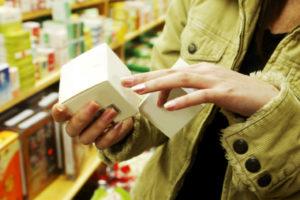The first of what we hope will be many posts by our dental hygienist Brittani…
A recent conversation with a patient about home hygiene products inspired me to do some digging. It’s only been 5 years since I graduated from dental hygiene school, and a lot has changed in just that short amount of time.
Walk down the dental aisle of your favorite market, and you see stacks upon stacks of products from the likes of Crest, Colgate, Aquafresh and Listerine. Listerine was THE recommended product in hygiene school. Our instructors constantly told us how it is an antiseptic that kills 99% of germs. Who wouldn’t want that, right?
Well, working for a biological dentist has opened my eyes and made me realize that reading labels is a must before buying or using any particular product.
 The product my patient mentioned is a new one called Listerine Naturals. What could be wrong with that? So I went to the product website – and found out pretty quickly that it’s not quite so “natural” as it looks.
The product my patient mentioned is a new one called Listerine Naturals. What could be wrong with that? So I went to the product website – and found out pretty quickly that it’s not quite so “natural” as it looks.
But that’s no big surprise. The word “natural” isn’t regulated. So what’s considered “natural” by the makers of Listerine?
Can Listerine still be considered “natural” if it contains alcohol – which it does, in large amounts? They say yes, for the alcohol they use is derived from corn. It’s a “naturally derived ingredient.”
My thought: Corn is one of the most genetically modified crops out there. Currently, about 85% of all US corn is GMO. How can this be considered natural?
This alcohol – ethanol – is also the same stuff that’s used to make cars run. If it’s okay for cars, it must be okay for people, right? Wrong!
Then there’s the matter of preservatives – something I’ve also had a good education in since coming to work for a biological dentist. Our patients talk a lot about avoiding the inner aisle of the grocery store and concentrating on the outskirts, where the fresh food is. The stuff in cans and boxes only stays good from preservatives.
One common preservative shows up in Listerine Naturals: sodium benzoate. It may be harmless. But it’s still not natural.
I don’t know about you, but when I see this kind of thing, I can’t help but think that I’m being lied to by a company that wants my money, that knows it can get more by calling something “natural.”
If it really were natural, I wouldn’t mind paying. But that doesn’t seem to be the case here.
 It’s important to me to be an educated consumer so I can help my patients be educated, as well as open-minded, about the products on our shelves.
It’s important to me to be an educated consumer so I can help my patients be educated, as well as open-minded, about the products on our shelves.
Flip over the package. Read the label. What’s really in the thing you’re thinking of buying? Is it something you want in YOU? Even floss comes fluoridated now.
It really is okay to be hesitant and ask questions. After all, this is your health we’re talking about.
Image by Kari Burks, via Flickr